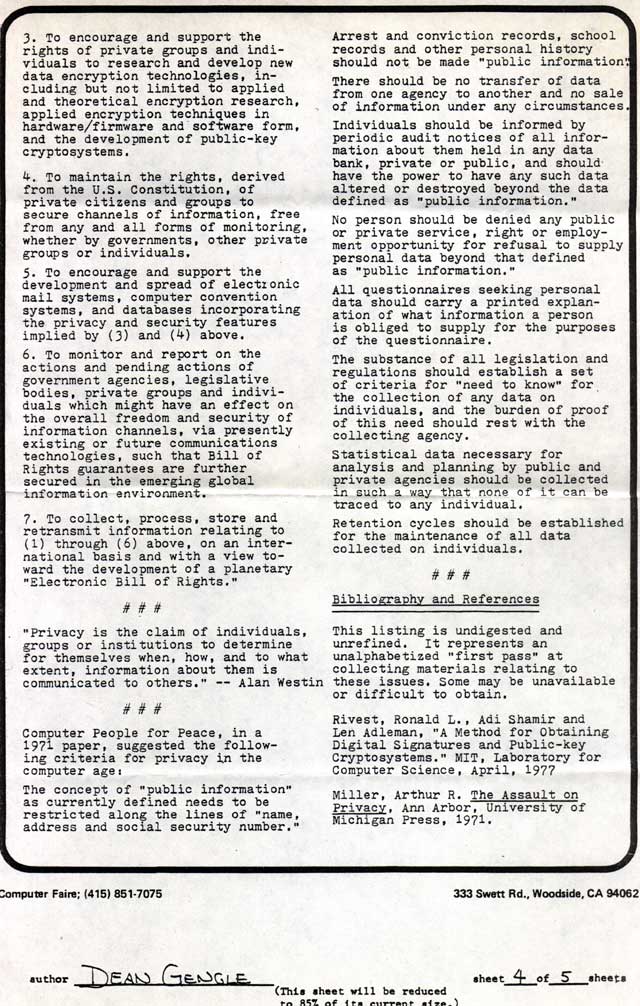CommuniTree

TOWARD AN ELECTRONIC BILL OF RIGHTS
3. To encourage and support the rights of private groups and individuals to research and develop new data encryption technologies, including but not limited to applied and theoretical encryption research, applied encryption techniques in hardware/firmware and software form, and the development of public-key cryptosystems.
4. To maintain the rights, derived from the U.S. Constitution, of private citizens and groups to secure channels of information, free from any and all forms of monitoring, whether by governments, other private groups or individuals.
5. To encourage and support the development and spread of electronic mail systems, computer convention systems, and databases incorporating the privacy and security features implied by (3) and (4) above.
6. To monitor and report on the actions and pending actions of government agencies, legislative bodies, private groups and individuals which might have an effect on the overall freedom and security of information channels, via presently existing or future communications technologies, such that Bill of Rights guarantees are further secured in the emerging global information environment.
7. To collect, process, store and retransmit information relating to (1) through (6) above, on an international basis and with a view toward the development of a planetary "Electronic Bill of Rights."
# # #
"Privacy is the claim of individuals, groups or institutions to determine for themselves when, how, and to what extent, information about them is communicated to others." -- Alan Westin
# # #
Computer People for Peace, in a 1971 paper, suggested the following criteria for privacy in the computer age:
The concept of "public information" as currently defined needs to be restricted along the lines of "name, address and social security number."
Arrest and conviction records, school records and other personal history should not be made "public information."
There should be no transfer of data from one agency to another and no sale of information under any circumstances.
Individuals should be informed by periodic audit notices of all information about them held in any data bank, private or public, and should have the power to have any such data altered or destroyed beyond the data defined as "public information."
No person should be denied any public or private service, right or employment opportunity for refusal to supply personal data beyond that defined as "public information."
All questionnaires seeking personal data should carry a printed explanation of what information a person is obliged to supply for the purposes of the questionnaire.
The substance of all legislation and regulations should establish a set of criteria for "need to know" for the collection of any data on individuals, and the burden of proof of this need should rest with the collecting agency.
Statistical data necessary for analysis and planning by public and private agencies should be collected in such a way that none of it can be traced to any individual.
Retention cycles should be established for the maintenance of all data collected on individuals.
# # #
Bibliography and References
This listing is undigested and unrefined. It represents an unalphabetized "first pass" at collecting materials relating to these issues. Some may be unavailable or difficult to obtain.
Rivest, Ronald L., Adi Shamir and Len Adleman, "A Method for Obtaining Digital Signatures and Public-key Cryptosystems.11 MIT, Laboratory for Computer Science, April, 1977
Miller, Arthur R. The Assault on Privacy, Ann Arbor, University of Michigan Press, 1971.